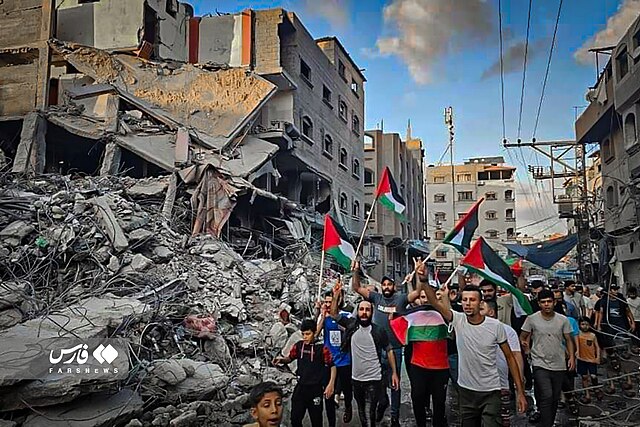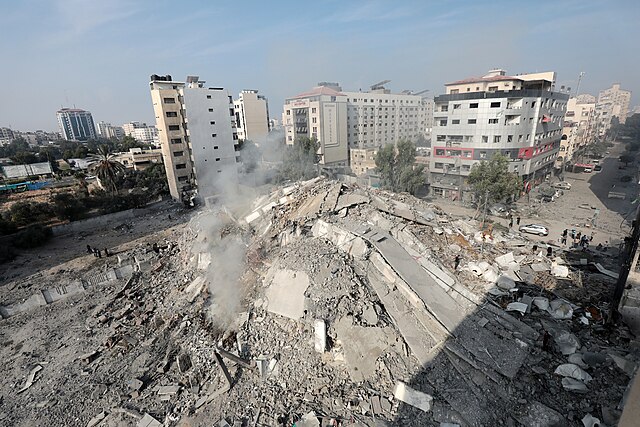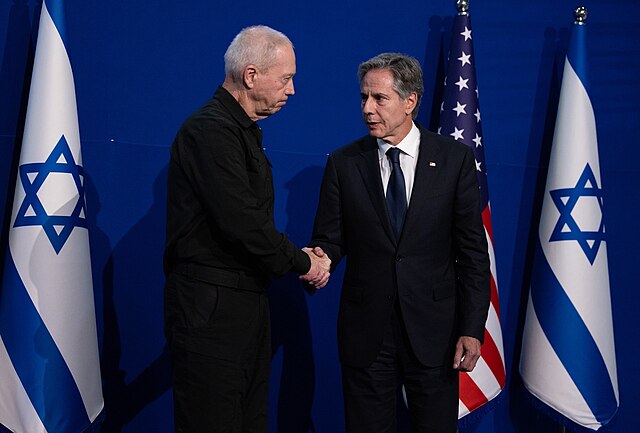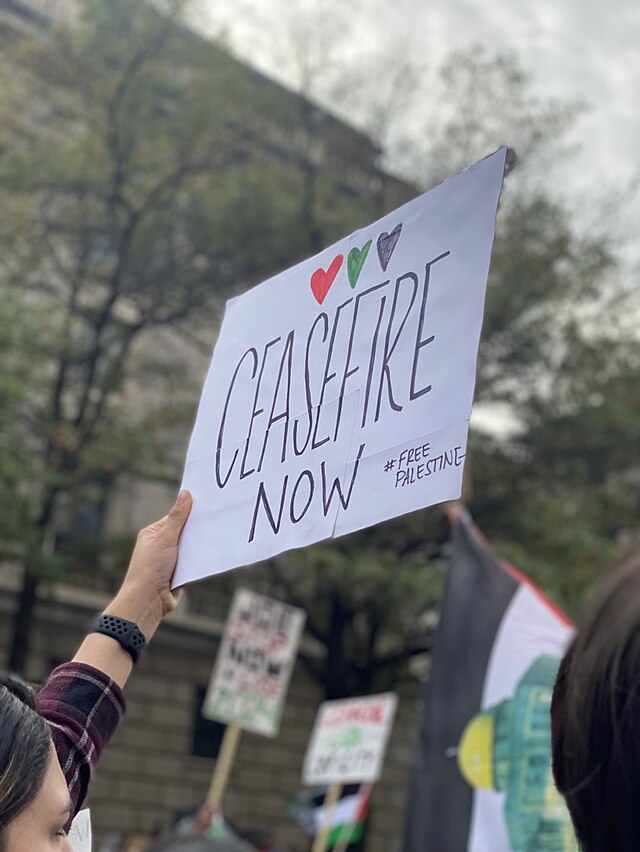Debating Pause vs. Ceasefire in Gaza While Thousands Massacred

By: Bishara A. Bahbah / Arab America Featured Columnist
As I write this article, I am dumbfounded by the United States and Western countries’ inaction and by the extent of Israel’s brutality in the killing of Palestinian civilians in Gaza. During a month of brutal fighting between Israel and Hamas, the growing list of Palestinian victims is staggering and keeps rising by the minute. Hitherto, these are the latest figures:
⇒ 10,500 killed – 70 percent are women and children.
⇒ 4,500 children killed.
⇒ 3,000 missing
⇒ 27,000 civilians wounded

While these numbers of killed, wounded, and missing Palestinians in Gaza rise by the minute, the world, particularly the United States, Israel,and some of their allies, are engaged in a time-delaying tactic debating whether there should be humanitarian “pauses” or a “ceasefire” in Gaza.
From a legal perspective, the critical difference between “pause” and “ceasefire” relates to the “purpose of the suspension of fighting – whether it is to allow a specific humanitarian activity to be conducted, or whether it is a generalized suspension of hostilities.”
Helen Duffy, a professor of international humanitarian law and human rights at Leiden University in the Netherlands, said the difference between a “pause” and a “ceasefire” is “more political than legal.” She noted, “Ceasefire or cessation of hostilities suggests [an agreement] that is, or at least could be, a permanent end to hostilities… humanitarian pause sends a clear message that it is temporary and for one purpose only.”
It is important to note that according to the Practical Guide to Humanitarian Law, “humanitarian assistance must not be conditional.”
Israel and the United States fear that a “ceasefire” now would leave Hamas in place as a political and a military entity, allow it to regroup, and potentially be able to fight Israel at future dates.
Those demanding a “ceasefire” argue that a humanitarian pause will not offer the time and security needed to meet even basic civilian needs, given the scale of damage, death, and deprivation in Gaza after a month of intense fighting.
Egypt’s foreign minister, Sameh Shoukry, speaking to journalists next to the U.S. Secretary of State, argued, “It is our position that a ceasefire is imperative to deal with the humanitarian consequences of this crisis.”
On one side of this debate stands the United States, Israel, and some of their European allies. They have been calling for a “pause” in the fighting to allow aid to enter Gaza during a specific period, let dual citizens leave, and allow a small number of wounded Palestinians to leave Gaza to be treated at the field hospitals set up by Egypt and several other countries on the Egyptian side of the Gaza-Egypt border.

Immediately after Hamas’ unprecedented and surprise attack on Israel on October 7, Israel’s defense minister, Yoav Gallant, announced that there would be no food, water, medication, and fuel supplies allowed into Gaza. Under immense international pressure and after long delays, Israel allowed the entry of a limited number of aid trucks into Gaza. Unfortunately, the permitted aid is a fraction of what Gazans need. The entrance of food trucks has been contingent upon the release of dual citizens and hostages in Gaza.
Amnesty International has called for a “ceasefire” in the fighting in Gaza. “If you pause [fighting] for a few hours or days, it would be insufficient given the scale of needs within Gaza,” said Amnesty International UK crisis response manager Kristyan Benedict. She added:
A durable, negotiated ceasefire is needed to get aid in food, medicine, and water to evacuate those needing medical treatment and repair infrastructure, particularly hospitals and shelters that have been bombed. You can’t do that in hours or days – you need certainty to rebuild.
Neither Israel nor the United States truly cares about the loss of civilian life among Palestinians in Gaza. Publicly, they say that they care, but their actions demonstrate otherwise. They want to decimate Hamas militarily and politically, irrespective of the mounting loss of civilianlives. As Biden has said, there cannot be a return to the “status quo.”
Israel’s actions in Gaza have turned into pure revenge exacted against unarmed civilians. Israel’s mighty military machine, mainly financed by the United States, is pitted against Palestinian fighters who are determined to die until the last man standing.
Israel’s prime minister, Benjamin Netanyahu, has said that there would not be a “ceasefire” until all the hostages taken from Israel are returned. Netanyahu is known to say one thing and mean another. His words cannot be trusted.
It appears, however, that a ray of hope might emerge from under a Gaza that has been reduced to rubble. The United States is now calling for a “concentrated effort” by world leaders to work toward a two-state solution.
Different from all past U.S. presidents since Richard Nixon, Biden came into office unwilling to prioritize peace negotiations between Israel and Palestine. He focused, instead, on a strategy of managing the conflict by supporting security cooperation between Israel and the Palestinian Authority. Biden was more concerned about the increasing threat from China in the Indo-Pacific region. Biden’s priority in the Middle East has been to push for Israel’s integration into the region by establishing ties with individual Arab countries, particularly Saudi Arabia.

While the talk of a two-state solution is comforting, the current carnage in Gaza is not. There must be an immediate, unconditional, and verifiable ceasefire to stop the genocide that Israel is committing in Gaza.
About the Author: Bishara A. Bahbah is a senior fellow and a featured columnist at Arabamerica.com. He taught at Harvard University and was the Middle East Institute’s associate director at Harvard’s Kennedy School of Government. He served on the Palestinian negotiating team and was editor-in-chief of the Jerusalem-based Palestinian newspaper, Al-Fajr.
Check out Arab America’s Blog!








